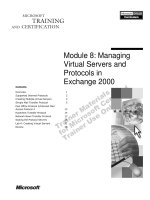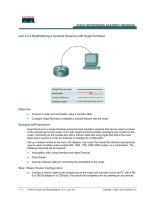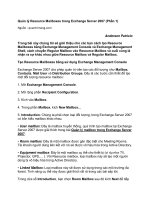Tài liệu BUSINESS START-UP & RESOURCE GUIDE STARTING A BUSINESS IN NORTH CAROLINA doc
Bạn đang xem bản rút gọn của tài liệu. Xem và tải ngay bản đầy đủ của tài liệu tại đây (463.52 KB, 58 trang )
Published by the University of North Carolina’s
Small Business and Technology Development Center
Get your free download of this publication at www.sbtdc.org/pdf/startup.pdf
BUSINESS START-UP &
RESOURCE GUIDE
STARTING A BUSINESS IN NORTH CAROLINA
ii
BUSINESS START-UP & RESOURCE GUIDE
iii
BUSINESS START-UP & RESOURCE GUIDE
TABLE OF CONTENTS
Business Start-Up Planning 1
Assess Yourself as a Potential Business Owner 2
Personal characteristics 2
Demands of owning your own business 2
Business experience and management skills 2
Self-analysis 3
Conclusions 5
Determine Concept Feasibility 6
Define your business idea 6
Redefine the concept 6
Define your market through research and analysis 7
Enhancing your chance for success 9
Examine Critical Issues & Make Important Decisions 10
Entry options 10
Buying an existing business 10
Buying a franchise 12
Starting a new business 13
Selecting and using professionals 14
Selecting a business location 16
Minimizing your risks 16
Insurance protection 17
Legal Considerations & Requirements 18
Regulatory requirements 18
Tax information 20
Incorporating a business 23
Insurance 23
Protecting intellectual property 24
Select the type of business structure 24
Employer responsibilities 27
Develop Your Business Plan 30
Business plan outline 30
© 2012 by the University of
North Carolina’s Small
Business and Technology
Development Center
5 West Hargett Street
Suite 600
Raleigh, NC 27601-1348
(919) 715-7272 or
(800) 258-0862 (in NC only)
All rights reserved. No part
of this publication may be
reproduced, stored in a
retrieval system, or
transmitted in any form and
by any means—electronic,
mechanical, photocopying,
recording, or otherwise—
without the prior written
permission of the publisher.
Revised edition
February 2012
This material is based
on work supported by
the US Small Business
Administration (SBA).
Any opinions, findings,
conclusions, or
recommendations
expressed are those of
the author(s) and do
not necessarily reflect
the views of
the SBA.
iv
BUSINESS START-UP & RESOURCE GUIDE
Arrange Your Business Financing 35
Getting the funding you need 35
Equity funding 35
Debt funding 37
How to choose a banker 39
What a lender looks for 40
Tips for getting and using small business credit 41
Worksheet: Uses and sources of funds 43
Resource and Information List 44
State resources 44
Federal resources 45
Other resources 46
Licenses, permits and taxes 47
Internet resource addresses 48
Index 49
v
BUSINESS START-UP & RESOURCE GUIDE
INTRODUCTION
BEVERLY PERDUE, GOVERNOR OF NORTH CAROLINA
Small businesses are the lifeblood of our national and state economy.
The entrepreneurial spirit that propels people to create and grow new
businesses has been an essential part of our growth as a state.
The Small Business and Technology Development Center (SBTDC) has
long been an organization which nurtures this entrepreneurial spirit by
providing counseling and training for would-be business owners. This
Business Start-up and Resource Guide is one of the most highly used
and valued tools used by people who are thinking about starting a
business in North Carolina. The SBTDC also provides valuable help
and counseling to established businesses as they grow.
The SBTDC is one of the reasons that North Carolina is known as a
great place to start and develop a business. By working closely with
partners across the state, it will continue to play a role in making us an
even more business-friendly state.
vi
BUSINESS START-UP & RESOURCE GUIDE
ABOUT THE SBTDC
The North Carolina Small Business and Technology Development Center (SBTDC) is a business advisory
service of the University of North Carolina System, administered by NC State University, and operated in
partnership with the U.S. Small Business Administration. The SBTDC is also a strategic partner of the North
Carolina Department of Commerce.
SBTDC specialists assist small and mid-sized businesses throughout North Carolina from 16 offices across
the state – each affiliated with a college or university. The SBTDC’s core mission is to help North Carolina
businesses grow and create new jobs to benefit all North Carolinians. Most SBTDC services are free of
charge, and all services are confidential. Since 1984, the SBTDC has helped over 120,000 North Carolina
entrepreneurs make their business better.
For further information, visit .
The SBTDC’s statewide team provides personalized management counseling and education services
designed to help small and midsized businesses:
• Obtain quality business and market information
• Evaluate and improve financial performance
• Access new capital and markets
• Improve management and employee performance
• Make better decisions and achieve their goals
Our services include not only general business counseling, but also specialized assistance delivered by
specific units and personnel within the SBTDC.
PROCUREMENT TECHNICAL ASSISTANCE (PTAC)
Our counselors help businesses: identify contracting opportunities; help them understand and meet
contracting requirements and regulations; develop bids and proposals; manage contracts; and prepare them
for future contracts and private sector sales.
TECHNOLOGY DEVELOPMENT & COMMERCIALIZATION
The SBTDC provides specialized services to businesses looking to advance, protect, and commercialize their
research, innovations, and new technology.
INTERNATIONAL BUSINESS DEVELOPMENT (IBD)
The SBTDC’s International Business Development unit assists small and mid-sized businesses with
exporting. Our IBD specialists are highly trained, Certified Global Business Professionals (CGBP) with
extensive experience in international business development.
STRATEGY DEVELOPMENT AND IMPLEMENTATION
SBTDC assessments, strategic performance retreats and ongoing counseling help owners and managers
assess and benchmark company performance, develop and implement successful strategies, identify
priorities and action steps, and measure progress.
1
BUSINESS START-UP & RESOURCE GUIDE
BUSINESS START-UP PLANNING
CHECKLIST FOR
STARTING A BUSINESS
Assess yourself as a potential
business owner
Determine concept feasibility
Examine critical issues and make
important decisions
Investigate legal considerations
and requirements
Develop your business plan
Arrange your financing
2
BUSINESS START-UP & RESOURCE GUIDE
ASSESS YOURSELF AS A POTENTIAL
BUSINESS OWNER
While owning a business may be a personal dream for many, managing a business may prove difficult
because of a lack of prior business ownership, experience or management skills. An honest self evaluation
will allow you to assess your personal characteristics and determine your willingness to meet the demands of
owning your own business.
Some of the questions below may be difficult to answer, but it is critical to evaluate your personal weaknesses
along with your strengths. When owner weaknesses are identified, partners, managers, staff members, other
external resources or education and training may be found to balance strengths and offset weaknesses.
Check the questions below that you can answer with “Yes.”
PERSONAL CHARACTERISTICS
Are you a leader?
Are you confident?
Do you like to make your own decisions?
Do you handle responsibility well?
Do you thoroughly plan projects from start to finish?
Are you self-disciplined and independent?
Are you flexible?
Do you read business publications?
Do you possess computer skills?
Are you aware of your current credit rating?
Are you or your spouse willing to dip into your savings if necessary to help support the business?
Will your spouse’s income be sufficient to support your family without income from your business?
DEMANDS OF OWNING YOUR OWN BUSINESS
Do you realize that running a business may require long hours and reduced personal income?
Do you have the emotional strength and good health to handle the work load and daily schedule that
owing your own business will require?
If required, are you prepared to temporarily lower your standard of living until your business is firmly
established?
Is your family prepared to support you (time and money required to start a business)?
BUSINESS EXPERIENCE AND MANAGEMENT SKILLS
What basic skills do you think you will need to succeed in business?
Do you possess those skills?
If you discover you do not have the basic skills needed for your business, are you willing to delay your
plans until you have acquired the necessary skills?
Have you ever worked in a managerial or supervisory position?
Have you hired and fired people before?
Have you ever worked in a business similar to the one you are considering?
Have you had any business training in school?
3
BUSINESS START-UP & RESOURCE GUIDE
Do you understand business financing and cash flow management?
Are you aware of the record keeping requirements expected in managing a small business?
Do you understand the fundamentals of marketing and market development?
SELF-ANALYSIS
This self-test is simply an overview of the personal characteristics and basic skills needed in small business
ownership. The questions with a “Yes” answer indicate the presence of a strength or attribute needed to
successfully manage a small business. Those not checked might indicate weaknesses or a lack of willingness
to make the sacrifices necessary to run a small business.
If you decide to continue with plans to establish a business, then you should resolve to change each blank to
a “Yes.” A partner or other solution may provide balance for some weak areas, thus changing a few blanks to
“Yes.” However, if there are a significant number of unchecked boxes, overcoming problems may require
more development on your part.
Identify the five most important interests, skills, or previous work experience that you enjoyed:
Write below any opportunities that may be associated with these characteristics, skills, or previous work
experience.
Based on your interest, abilities, and experience, summarize your strengths and weaknesses as they relate to
the business skills necessary to start and grow a successful business.
Also ask someone who knows you well to identify your strengths and weaknesses. Compare your answers
with theirs.
My strengths are:
4
BUSINESS START-UP & RESOURCE GUIDE
My strengths identified by someone who knows me well are:
My weaknesses are:
My weaknesses identified by someone who knows me well are:
Identify ways you can overcome these weaknesses:
What kind of commitment are you willing to make to get your business off the ground?
Time commitment: _________________________________________________________________
Resources commitment: _____________________________________________________________
Are you prepared to lose your investment and other savings? ____ Yes ____ No
5
BUSINESS START-UP & RESOURCE GUIDE
What are your expectations for the business:
Within one year?
After three years?
CONCLUSIONS
Understanding your personal characteristics, required business skills, and demands of business ownership
are critical in helping you find the business best suited to you and your interest. Honestly assessing yourself
will help you determine what you need to do to acquire the skills you need, clarify your expectations, and
motivate you to seek ways to keep learning as you proceed to develop your business idea.
6
BUSINESS START-UP & RESOURCE GUIDE
DETERMINE CONCEPT FEASIBILITY
Many questions must be answered and certain information gathered before determining the feasibility of your
business idea. Careful research and analysis will help you in evaluating your concept and assist you in
assessing your idea.
DEFINE YOUR BUSINESS IDEA
The first step is to begin gathering as much information as possible about your business. You will want to
read articles, books, and trade publications. It is also a good idea to visit existing businesses and begin the
research and planning process.
It is important to remember that every business is unique. Taking time to explore your concept will help you
identify those specific factors that make your business concept unique. The following questions will guide you
in defining your business concept. While looking for the answers, also attempt to identify the potential
problems which might relate to your business idea.
What business will you be in?
What product or service will you provide to your customers?
Who will buy your product or service?
Why will your customer buy from you?
When will your customer buy your product or service?
How will your customer know you have products or services available?
How much will your customers pay for your product or service?
Using the answers you have provided to the questions above, write a paragraph describing your business
concept.
REDEFINE THE CONCEPT
As you refine your idea, there are business-specific issues that need to be addressed:
What specific product or service will your business provide?
Do you have the capability or skills to provide this product or service? If not, how will you overcome
this deficiency?
What makes your business idea, product or service unique?
What will be your competitive advantages?
What competitor disadvantages do you have?
Have you identified any potential problems? If so, how will you overcome them?
7
BUSINESS START-UP & RESOURCE GUIDE
In addition to looking at the business concept, you should also explore the market and the industry you are
interested in by seeking out the opportunities and identifying potential problems. Answering the following
questions will help you assess your market and industry:
What industry competition exists in your town or region?
Identify your competition:
What will you do to better provide a unique or better product or service than your competition?
If there is little or no competition, why not?
Are there potential international or government procurement opportunities in your product or service?
If so, identify them.
Are there emerging opportunities in the market place? If so, identify them.
Are current business and economic trends favorable?
o Interest rate
o Inflation
o Business climate
o Business trends
o Unemployment
Remember, it is important to evaluate all aspects of your business concept and to continually balance your
ideas against reality.
After defining and refining your business idea, does it still look like a good idea to you? If so, you will now
want to do more in-depth market research and analysis to better define your market and opportunity.
DEFINE YOUR MARKET THROUGH RESEARCH AND ANALYSIS
While market research provides data and information about the industry and its customers, market analysis
helps the business owner understand the business environment and the basis on which s/he must compete.
Market research
Market research tells you who your customers are, where they are, and how large the potential market is.
Through research, you will be able to gather certain information and data such as:
Demographics
Size of your potential market
Customer lifestyles and buying behavior
Specifically who the customer is
Determine demand for your product or service
There are two basic types of market research—primary and secondary:
Primary research is research gathered firsthand through techniques like surveys, questionnaires, focus
groups, or in-depth interview. Primary research can be time consuming and possibly expensive.
8
BUSINESS START-UP & RESOURCE GUIDE
However, it provides the business owner with the opportunity to hear customer feedback and act accordingly.
Primary research methods
Surveys
In-depth interviews
Competitor analysis
Questionnaires
Focus groups
Tracking customer response to advertising and promotion
Website and social media metrics
Secondary research is already published research. It includes sources like directories, industry journals, and
association publications. Secondary research is accessible, less expensive, can be conducted on a
continuous basis, and can be combined with the business owner’s knowledge of the business, geographical
conditions, and customer base. The business owner can informally tailor the research findings to meet the
needs of the business.
Secondary research sources
(Available at many libraries)
Business directories
Industry reports
Newspapers
Business magazines
Trade publications
Market analysis
Market analysis helps the business owners understand the business climate in which s/he must compete. It
is through market analysis that a business owner determines if a certain business or industry provides an
attractive opportunity.
Market analysis provides competitive analysis which includes:
Industry analysis: Evaluates the industry’s overall opportunity and attractiveness, including ease of
entry, availability of substitutes, and buyer/supplier issues.
Competitor analysis: Who are the primary competitors, and what are their strengths and weaknesses?
Business analysis: Identifies the strengths, weaknesses, opportunities, and threats of your identified
market.
EXAMPLES OF SECONDARY RESEARCH SOURCES
PRINT RESOURCES
(Available at many public and university libraries)
Demographics USA
Encyclopedia of American Industries
Encyclopedia of Emerging Industries
Encyclopedia of Associations
Household Spending
Lifestyle Market Analyst
Market Share Reporter
9
BUSINESS START-UP & RESOURCE GUIDE
Standard & Poor’s Industry Surveys
US Industry & Trade Outlook
ONLINE MARKET RESEARCH RESOURCES (THE BASICS)
NCLive is available free online through most North Carolina university, community college, and public
libraries. You can gain access by logging in using your Library Card Number at www.nclive.org.
Business Directories
Hoover’s –
Demographics
Simply Map (includes psychographic and consumer expenditure data) –
US Census Bureau’s American Fact Finder – –
NC State Data Center –
Websaras-NC –
Psychographics
My Best Segments –
EASI Demographics –
ESRI –
Industry Analysis
SBTDC’s “Conducting an Industry Analysis” –
BizMiner –
Hoover’s Online –
Zapdata Industry Reports –
Market Research.com –
SEC Filings (for competitor analysis) –
ENHANCING YOUR CHANCE FOR SUCCESS
There are always risks in starting a new business. As a business owner, you will want to lower your risks by
incorporating the following ideas into your start-up plan:
Plan ahead.
Make sure you have experience in management and in the type of business you want to start.
Try to best use your strengths and interest in the most appropriate way.
Make decisions based on facts or reliable information. Don’t make hasty decisions.
Seek the support of your family during the start-up phase and difficult times.
Seek advice from a counselor, accountant, attorney, or others.
Talk to others in the same business.
Be persistent, and DON’T GIVE UP!
10
BUSINESS START-UP & RESOURCE GUIDE
EXAMINE CRITICAL ISSUES &
MAKE IMPORTANT DECISIONS
As you explore starting your own business, you will find there are many decisions which must be made and
important issues to consider in order to minimize your risk and increase your success.
Four important topics covered in this section are:
Entry options
Selecting and using professionals
Selecting a business location
Minimizing your risks
ENTRY OPTIONS
You may be considering starting your own business as a result of a life situation triggering your
entrepreneurial desires. Such events could include corporate down-sizing, an accident that limits your
physical abilities, or receipt of an inheritance. There are many reasons why people want to go into business
for themselves, and there are various options for entering a business of your own. The most common entry
options are:
Buying an existing business
Buying a franchise
Starting a new business
Buying an existing business
Purchasing an established business can lighten the burden of start-up costs, lag time without a salary,
establishing markets, and other costs associated with the creation of a new business. Established businesses
may have existing good will – intangible (non-monetary) assets such as reputation or historical value.
The decision to buy a business requires careful evaluation of many factors, including pricing and financing
your purchase.
The potential buyer must understand the criteria for selecting a business as well as the motivation for wanting
to purchase the business.
Consideration should be given to the following:
What is your experience with the industry and/or management?
Does the business match your strengths?
Is the business what you enjoy doing?
Is it in a desirable location?
What are you willing to invest?
Can you get financing?
What size business do you desire in terms of sales, profit, and employees?
Is the business fairly priced?
Is it profitable?
11
BUSINESS START-UP & RESOURCE GUIDE
If the business under consideration has a product or service outside your area of expertise, it is important to
make certain that the key employees will stay after the sale or that you can hire someone with similar
experience.
Finding a business for sale
Finding a good business opportunity is not always easy. Sources to consider:
Printed advertisements
Trade sources and suppliers in the industry
Friends and acquaintances
Intermediaries such as business brokers, real estate brokers or acquisition specialists
Evaluating the business
As a buyer, first evaluate a business by reviewing its history and the way it operates. Develop an
understanding of the business’ method of acquiring and serving its customers, determine how it generates its
sales, learn its marketing strategy, and develop an understanding of its finance and operations functions.
Checklist of material for the evaluation process*
Obtain the following information from the existing business:
3-5 years financial statements
3-5 years tax returns
Interim financial statements
Copies of all real estate, leases, or deeds
Debt schedule
Accounts receivable and aging schedule
Accounts payable and aging schedule
Inventory list
Supplier list (including contracts)
Customer list (including contracts)
Projections
Organizational charts and employee contracts
Industry information to which the owners may have access
Details of equipment leases and other contingent financial commitments
* CHECKLIST PROVIDED BY THE SABRE GROUP—CONFIDENTIAL BUSINESS SALES AND VALUATIONS OF
GREENSBORO/RALEIGH/DURHAM/GREENVILLE
Important questions
Evaluate the business’ potential according to your goals, employer responsibilities, product or service
demand, market, and financial considerations.
Ask and get answers to questions regarding all aspects of an existing business before entering any purchase
agreements. Start with basic questions, like those listed below. Others may be required depending on the
specific business:
Why is the business for sale? Has it been making a profit? If not, do you have a plan to make the
business profitable?
What kind of reputation does the establishment have currently? How would you change that
reputation? What is the price of good will? What is the consistency of the client base – a few large
clients or many smaller customers?
12
BUSINESS START-UP & RESOURCE GUIDE
Will the sale include equipment, property, inventory, debts, employee contracts, name, logo, slogans,
signage, customer files, etc.?
Are all of the books in order and well maintained?
Have you reviewed the past and current financial statements with the counsel of an accountant?
Are there any liens against the property for sale? Are there any claims on inventory or equipment?
Have the taxes been paid to date?
Have you reviewed existing business contracts and the effect of the transaction on those contracts?
Are they loyal because of a personal relationship or because of the level of quality service?
Will the lease be transferred into your name or will the owner require a new lease? Is the location
suitable for your plans? Are there any environmental concerns with this location? Are there licensing
concerns?
What liabilities exist?
What policies have been established with the employees regarding work environment,
salary/commissions, benefits, vacation pay, and fringe benefits?
Will the owner be cooperative with the transition of ownership with regard to tax issues, utility
transfers, government requirements, employees, and other procedures?
Are there any environmental issues with respect to your chosen business?
If using a broker, do you realize s/he is representing the interest of the seller?
Is the seller willing to sign a non-compete agreement?
Will the seller agree to a contractual arrangement for a period of consultation?
Consider whether owner is willing to finance all or some of the purchase price
The services of an accountant, attorney, and banker are recommended when buying an existing business.
Investigation and research will be crucial to uncovering as much information as possible about the business
for sale.
Buying a franchise
Franchising has emerged as a popular way for potential business owners to start a new business. A franchise
offers advantages in name and product recognition, proven operation procedures as well as volume
purchasing power. In this arrangement, the provider, or franchisor, contracts with you, the franchisee, to give
you the right to sell or distribute a service or product under the franchisor’s system in a particular area. As
with any opportunity, both advantages and disadvantages must be examined before a decision to invest is
made.
ADVANTAGES OF A FRANCHISE
Some require relatively small capital investment with franchise financing
Initial corporate support for start-up
Continuous management training and counseling
Existing goodwill and brand name appeal (sometimes)
Standardized quality of goods/services
Proven products and business format
Some opportunities require no prior experience in that business field
Buying power and programs
Development of advertising and promotions programs (both local and national)
Site analysis
Proven business model
DISADVANTAGES OF A FRANCHISE
Complicated legal negotiations
13
BUSINESS START-UP & RESOURCE GUIDE
Restrictions on purchasing
Franchising fees
Required to share portions of business profits with corporation (sales/royalties)
Loss of personal control over some aspects of operation (e.g., use of name/logo for advertising,
territory, uniforms, product purchasing requirements)
Less freedom and opportunity for creativity
Potential problems if owner wants franchisor to buy franchise back
Limited control over pricing, product lines, and suppliers
Human resources policies may be instituted by corporation (potentially unsatisfactory training
programs)
Actions by the corporation may affect business of franchisee (especially new store locations close to
yours)
Locate a list of lawyers specializing in franchise negotiations while in the research stage. Once a franchise
opportunity has been selected, retain a lawyer for every step of the negotiations. The negotiations serve as
the foundation of the franchise. Working with the lawyer, set policies and agreements that will enable the
franchise to thrive now and in the future. All obligations, rights, privileges, risks, opportunities, assets, and
liabilities must be detailed and agreed upon by all parties before the contract is signed.
The Federal Trade Commission offers the free publications, Consumers Guide to Buying a
Franchise, and Franchise and Business Opportunities on its website at:
www.ftc.gov/bcp/conline/pubs/invest/buyfran.htm
www.ftc.gov/bcp/conline/pubs/invest/franchise.htm
A number of books on franchising are also available at public libraries and bookstores.
Starting a new business
Starting your own business can be a very exciting endeavor. It allows you great freedom and opportunity to
explore and develop your own business idea. It is an opportunity for you to exercise your creativity and
thinking ability to do the following:
Research your business idea
Develop a strategy
Determine your marketing approach
Address key operational issues
Make your own decisions
Develop your business idea from the ground up
Successfully starting your own business can provide a sense of accomplishment and satisfaction in knowing
you did it yourself. However, if the business fails, you must assume all the liabilities and emotional strain that
goes with it. There are many misconceptions surrounding owning one’s own business. Consider the following
common misconceptions:
I will be my own boss.
Being your own boss does not mean you can play golf or go fishing anytime you want. The reality is the
business and your customers become your boss and can demand 50-65 hours per week.
14
BUSINESS START-UP & RESOURCE GUIDE
I can get rich overnight.
Small business and free enterprise provides a great opportunity to build wealth; however, it will take time.
Studies indicate that more than a third of small businesses that grow significantly do so after 10 or more years
of existence.
I can expect immediate income from my business.
This is not likely. Generally, it takes 6-12 months before a new business can start to pay the owner a decent
salary. You should have a cash reserve or savings to provide financial support for you and your family during
the start-up phase.
I can start my business with little or no money.
Poor capitalization is one of the major causes of business failure. Lack of capital results in negative cash flow,
which can result in poor business decisions and serious credit problems.
I will incorporate my business and use other people’s money.
Many books and articles have been written about using OPM (other people’s money). It is difficult to borrow
your way to wealth as a new business. The corporate shield probably will not protect you in case of failure.
Most banks today will require you to personally guarantee the corporate loans for start-up businesses.
Consequently, all your assets will be at risk.
You might ask, “How do I know what kind of business to start?” or “How are businesses formed?” Business
ideas emerge in many ways. Examples are:
Finding and meeting an unfulfilled market need
Building a business on an existing customer relationship
Spinning off a business based on your experience and knowledge
Capitalizing on a new invention or technology
Growing a part-time business or hobby into a full-time opportunity
You must decide what kind of business you want to start. It is also important to examine yourself and decide
what you want from the business. Keep in mind that starting a business requires careful thought and planning.
Many aspects of the business must be considered, including legal issues, financing, marketing concerns,
employee relations, accounting procedures, equipment purchases, and location.
Research, preparation, organization, and planning are critical in a start-up venture to minimize risk and
enhance your chance for success. Contact your small business assistance providers to assist you during this
critical time (see Resource & Information List section).
SELECTING AND USING PROFESSIONALS
Starting your own business involves many decisions, which often seem overwhelming. It has been shown that
there is a strong correlation between using outside professionals and business success. In today’s business
world, where many new businesses fail within the first five years, it only makes sense to increase your
chances for success by seeking the broad experience and expertise that professional resources and advisors
can provide.
Outside advisors can assist you in making decisions based on facts, not wishful thinking. They can also
provide a reality check and give you insight in starting and guiding your business.
15
BUSINESS START-UP & RESOURCE GUIDE
There are two important categories of advisors: informal and professional.
INFORMAL ADVISORS INCLUDE:
Other business owners
Friends and family
Members of other entrepreneurial groups or projects
Members of your board of directors
PROFESSIONAL ADVISORS INCLUDE:
Lawyers
Accountants
Bankers
Insurance agents
Marketing professionals
Consultants
Small business assistance providers
Most professional advisors will expect to be compensated for their assistance while informal advisors typically
only need to be asked to help.
When selecting a professional advisor, look for a skilled advisor who meets your needs. Attributes you should
look for include:
Strong professional skills and knowledge
Integrity
Small business orientation
Engaging and creative
Positive attitude
Willing to listen
Team member and advisor
Selecting the right professional advisor will not only provide advice and consistency to help your business
succeed, but s/he can also be instrumental in identifying other professional team members.
To go about finding the right professional advisor, you should:
Ask small business assistance providers
Ask other business owners
Call the professional and schedule an appointment. Interview them as you would an employee. Be
sure to request references.
Look for a comfort level and confidence; confidence in their integrity, discretion, and concern for your
business.
If you already have a good relationship with a banker or other professional, s/he is a good source of referral.
16
BUSINESS START-UP & RESOURCE GUIDE
SELECTING A BUSINESS LOCATION
Location is more important to some businesses than to others. The importance of the location is determined
by certain characteristics of the business.
Factors that must be considered:
Do customers travel to the business or do employees travel to the customer?
Is convenience a key factor in relationship to what your business offers the customer?
Is your business offering a special product with little accessible competition?
Will your product or service require a specific location?
Will proximity to vendors and customers play an important role in your location?
Are transportation, labor, utilities, state and local taxes, zoning, and other regulations critical factors to
consider in your site selection?
Do traffic flow, parking and other business establishments impact your site selection?
How much space is required?
Do you need expansion capability?
Should you lease or buy a facility?
What are the terms of your lease, if leasing?
How is your rent determined? (Rent = cost of space + advertising)
What are the insurance requirements?
Do you understand home-based business expenses and requirements?
Do you understand the zoning and code requirements?
These questions represent some of the issues that need to be answered before making a business site
selection. Additional questions and information may be required depending on whether your business is a
service business, retail store, or manufacturing facility.
Local resources are available to assist you with your site selection.
Resources include:
Your Chamber of Commerce
NC Department of Commerce (www.nccommerce.com)
Economic Development Board (www.ncedb.com)
Duke Power (www.dukepower.com/forbusiness/ecdev)
Progress Energy (www.progress-energy.com/community/)
NC At Your Service (www.ncgov.com/asp/subpages/intention.asp?P=1&I=34)
Commercial real estate brokers
Your SBTDC counselor (www.sbtdc.org)
MINIMIZING YOUR RISKS
Risks abound in the business world. As an entrepreneur, you will want to protect your interest and minimize
your risk from the beginning. The time to address these important issues is during the planning stage. Advice
of professionals in accounting, insurance, banking, and law will help you make decisions to minimize your
risks and to identify your best protection options.
17
BUSINESS START-UP & RESOURCE GUIDE
Insurance protection
Insurance protection is an important consideration in minimizing risk. Oftentimes business owners lack
expertise when it comes to insurance needs.
Basic steps in developing an insurance program are:
Review your current coverage
Identify your insurance needs
Develop a plan (including the cost)
Seek professional advice
Most businesses will require the following types of insurance:
Fire insurance
Liability insurance
Automobile insurance
Worker’s compensation insurance
Depending on the type of business you are starting, other coverage you may need includes:
Business interruption insurance
Crime insurance
Group life insurance
Key man insurance
Disability insurance
Bonding
Most banks require insurance as a condition of their loan.
List below the things you must now consider in order to buy an existing business, start a business, or
purchase a franchise.
18
BUSINESS START-UP & RESOURCE GUIDE
LEGAL CONSIDERATIONS
& REQUIREMENTS
As an entrepreneur, it is your responsibility to ensure that your business is properly complying with state and
federal regulatory requirements, registration, permits, licenses, and employer responsibilities. Stiff penalties
may be assessed against you and/or your company if you are found in violation of certain government
requirements. This section will address three primary legal considerations:
Regulatory requirements
Legal structure of your business
Employee responsibility
REGULATORY REQUIREMENTS
Permits, licenses and regulations
Most businesses are required to obtain some kind of license or permit – city, state, and/or federal. Certain
types of businesses may be required to obtain special permits from local health authorities, building
inspectors, and police/fire departments. The business owner should take steps to ensure that the business
does not violate any zoning regulations or ordinances regarding hazardous activities. Mistakes in obtaining
the proper permits and licenses can be expensive, at best.
Federal licenses and permits
Most new small businesses are unlikely to require any federal permit or license to operate unless they are
engaged in:
Rendering investment advice
Preparing meat products
Selling alcohol, tobacco, and firearms
Federal permits or licenses are also necessary to start some large-scale operations in regulated industries,
such as:
Radio or television stations
Common carriers (telephone companies)
Produce drugs or biological products
Consult an attorney regarding regulatory requirements. Although a prospective business may not strictly fit in
one of these categories, it is important that you make certain that no federal regulations apply before starting
your business.
19
BUSINESS START-UP & RESOURCE GUIDE
State licenses and permits
For information regarding state licenses, contact:
Business Link North Carolina (BLNC)
NC Department of Commerce
4344 Mail Service Center
Raleigh, NC 27699-4344
(919) 807-4280 (in Raleigh) or (800) 228-8443
www.blnc.gov
The services provided by this office include:
Individualized assistance from counselors in identifying appropriate licenses and permits
Customized information packages including applications and instructions on applying for licenses
and permits
Resource center for information on over 700 business licenses and permits
To determine liability for license fees/taxes, contact:
NC Department of Revenue
501 North Wilmington Street
PO Box 25000
Raleigh, NC 27640
(877) 252-3052
www.dor.state.nc.us
Special licenses and permits
In certain instances, such as contractors’ licenses and bonding, day care certificates of competency, etc., you
will need to obtain specific industry licenses and permits. The Business Link North Carolina (BLNC) office
should be able to help you in this area, or refer to the numbers listed below:
BLNC (919) 807-4280 or (800) 228-8443
Alcoholic Beverage Permit (919) 779-0700
Rest Home License (919) 855-3765
Architecture License (919) 733-9544
Auctioneer License (919) 567-2844
Barber Examiners License
or Cosmetic Arts License (919) 733-4117
Electrical Contractors License (919) 733-9042
General Contractors License (919) 571-4183
Board of Funeral Service (919) 733-9380
Plumbing & Heating Contractors (919) 875-3612
Real Estate (919) 875-3700
Nursing Home or
Home Health Facility (919) 733-7461
Child Day Care License (800) 859-0829
This represents only a partial list. To verify the requirements for your business, contact Business Link North
Carolina (BLNC) at (800) 228-8443 or in Raleigh at (919) 807-4280.









